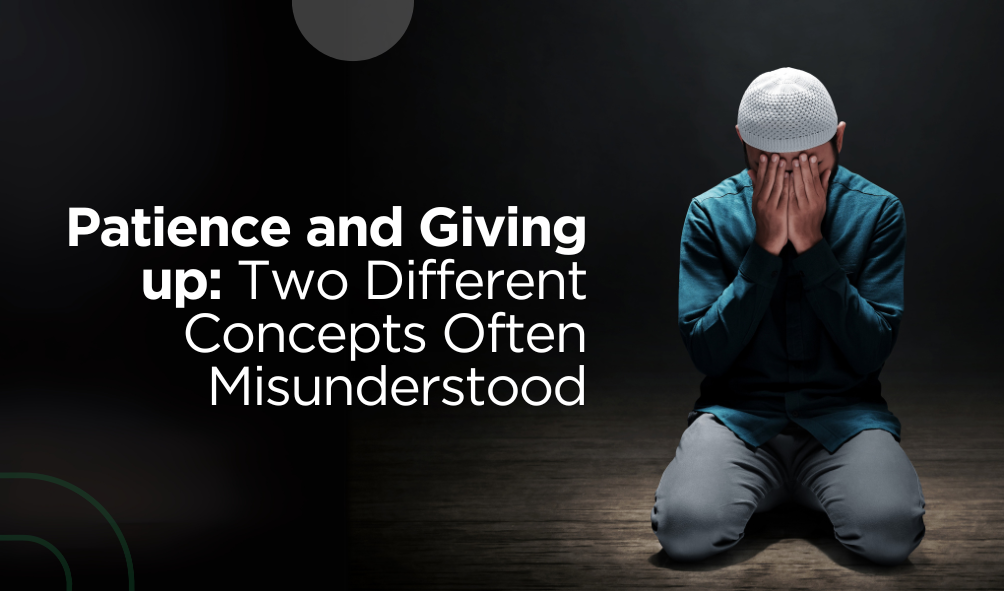Patience and Giving up: Two Different Concepts Often Misunderstood
The words patience and giving up are frequently used in everyday speech. They have different implications and meanings though. While giving up is sometimes understood as accepting fate without effort patience is a positive attitude that promotes tenacity and effort in the face of adversity. Sadly a lot of people confuse the two which causes misapplication. This article will go over the distinctions between patience and giving up as well as how crucial it is to comprehend these ideas in the context of life especially from an Islamic standpoint.
Patience: Perseverance in Maximum Effort
In Islam the concept of patience is highly regarded. In a literal sense patience is the ability to control oneself or persevere through challenges. Being patient means an active attitude of steadfastness and consistency in striving even in the face of difficulties or challenges. It is not just about remaining silent or accepting situations without taking action. Allah ﷻ stated in Qur’an:
And be patient, indeed Allah is with the patient 8:46.
The virtue of patience highlights the value of perseverance and persistent work. For instance when someone experiences business failure, patience means they dont give up but instead keep refining their plans and looking for new chances. In order to think clearly and make wise decisions patience also entails emotional control such as repressing sadness or anger. In this context the idea of tawakkal or reliance on God which refers to giving Allah the final say after making every effort is closely linked to patience.
Also read:Is Hidayah Awaited or Sought?
Giving up: Accepting Fate without Effort
Giving up on the other hand is frequently interpreted as accepting whatever occurs without a will to change or additional effort. In this way giving up tends to have a bad connotation since it disregards the obligation of humans to try and work. This type of submission runs counter to Islamic teachings which place a strong emphasis on exerting effort before entrusting the result to Allah ﷻ. According to the Quran, Allah ﷻ said:
In fact Allah will not improve a people’s situation until they improve themselves (Quran 13:11).
Islam dictates that proper change must be earned. When someone gets sick for example, they shouldnt just give up without getting help. They should instead try their hardest to get better before depending on Allah to provide the desired result. Giving up is a type of passivity that is incompatible with Islamic principles.
Principal Distinctions Between Giving up and Patience
Their approaches to effort are where patience and giving up diverge most. When used negatively giving up is a passive attitude of accepting fate without making an effort whereas patience is an active attitude that stresses consistency and perseverance in striving. Misguided giving up causes one to surrender before even trying whereas patience encourages one to persevere through the effort. A student who is patient for instance will continue to study and make an effort to comprehend the material even if it seems difficult when they are faced with a challenging exam. However giving up would cause the student to not even try and stop studying altogether arguing that the outcome is already predetermined.
Also read:Kufur Nikmat: Denial of Allah’s Blessings
Common Misconceptions
Its a common misconception that patience or tawakkal are synonymous with giving up. In actuality the highest level of effort always comes before proper giving up in Islam. Islamic teachings are incompatible with passive giving up which is a state of passivity. Likewise patience is frequently misinterpreted as inaction. Actually in order to be patient one must be proactive and emotionally strong when dealing with difficulties.
In Conclusion
Patience and giving up are two different ideas that are frequently confused. In contrast to giving up (in its negative sense) which is accepting fate without making an effort patience is a positive attitude that promotes tenacity and effort in the face of adversity. Being aware of the distinction between the two can improve our quality of life keep us motivated to work hard and help us steer clear of harmfully passive attitudes. Patience is more closely related to the idea of tawakkal which is putting all of ones effort into Allah ﷻ and then trusting Him with the outcome. Let’s not give up ane keep patience in our efforts in life.
Also read:Tawakkul in the Job Searching Process

Let’s Visit, Zeed and join for halal investment with Zeed.
References:
Liputan6. (n.d.). Apa Arti Tawakal dan Dalilnya: Memahami Konsep Penting dalam Islam. Retrieved from https://www.liputan6.com/feeds/read/5900692/apa-arti-tawakal-dan-dalilnya-memahami-konsep-penting-dalam-islam
UMS News. (2022). Kurma Sabar Bukan Berarti Pasrah dan Menerima. Retrieved from https://news.ums.ac.id/id/04/2022/kurma-sabar-bukan-berarti-pasrah-dan-menerima/
QuestionAI. (n.d.). Jelaskan Perbedaan antara Sabar dan Pasrah. Retrieved from https://www.questionai.id/questions-tjCc3C1c74/1-jelaskan-perbedaan-antara-sabar-dan-pasrahberikan
Republika. (n.d.). Redefinisi Ikhlas, Pasrah, dan Sabar. Retrieved from https://ihram.republika.co.id/berita/rn1dde313/redefinisi-ikhlas-pasrah-dan-sabar







